|
|
|
Sort Order |
|
|
|
Items / Page
|
|
|
|
|
|
|
| Srl | Item |
| 1 |
ID:
138461
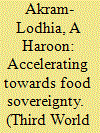

|
|
|
|
|
| Summary/Abstract |
Rural social movements and urban food activists have sought to build food sovereignty because it has the potential to be the foundation of an alternative food system, transcending the deep-seated social, economic and ecological contradictions of the global food economy.
However, continuing to build food sovereignty requires changes to global and local food systems that have to be undertaken in the messy reality of the present. This article therefore presents a series of wideranging, politically challenging but ultimately feasible interventions
that are necessary but not sufficient conditions for its realisation.
|
|
|
|
|
|
|
|
|
|
|
|
|
|
|
|
| 2 |
ID:
162622
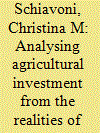

|
|
|
|
|
| Summary/Abstract |
Over the past decade, agricultural investment has been presented as a catchall solution to a converging set of global crises, often with poor rural communities as the proclaimed beneficiaries. Yet the promises of such investment, such as poverty alleviation and improved food access, are routinely at odds with realities on the ground. This article offers frameworks for analysis of agricultural investment that are grounded in the realities of small-scale food providers, drawing from two studies. The first study employs a right to food framework to identify the main channels through which food for consumption is procured by small-scale food providers and the factors impacting these channels. It draws on empirical data from within the Southern Agricultural Growth Corridor of Tanzania (SAGCOT), an investment model promised to lift rural communities out of poverty, which reflects a regional trend. Based on the shortcomings of the large-scale investments examined, the second study employs a food sovereignty framework to explore alternative forms of investment envisioned and/or already being put into practice by small-scale food providers in the SAGCOT area and elsewhere in Tanzania. While two different frameworks formed the basis of two different studies, both the studies and their frameworks are interrelated. The final section of this article makes the case for why both the right to food and food sovereignty are essential lenses for understanding agricultural investment vis-à-vis small-scale food providers and the ways in which they can serve as complementary tools for effective analysis.
|
|
|
|
|
|
|
|
|
|
|
|
|
|
|
|
| 3 |
ID:
138459
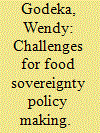

|
|
|
|
|
| Summary/Abstract |
Food sovereignty policy initiatives face significant challenges in their quest to be approved. This article examines the case of Nicaragua’s Law 693, the Law of Food and Nutritional Sovereignty and Security, which was passed in 2009. Drawing on empirical research, the article details the initial stages of the policy-making process – from the origins and development of the proposal for a food sovereignty law to its introduction and initial deliberation by the National Assembly to the breakdown in the approval process because of conflict over the law’s content. Using theoretical insights from the food sovereignty and food security policy literature, Law 693 is examined, noting key limitations food sovereignty faced during the policy-making process. The study finds that the strength and force of national food sovereignty discourses, the ability of food sovereignty advocates to convince others of the legitimacy and viability of the food sovereignty approach, and the willingness of the state to create the necessary conditions to foster food sovereignty are all important factors when evaluating the potential for food sovereignty to be successfully adopted into public policies.
|
|
|
|
|
|
|
|
|
|
|
|
|
|
|
|
| 4 |
ID:
086422
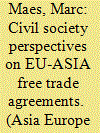

|
|
|
|
|
| Publication |
2009.
|
| Summary/Abstract |
This paper focuses on the positions taken by civil society organisations that actively campaign on trade policies. Trade campaigners oppose the neo-liberal approach to trade and development and advocate a much more gradual and prudent approach to trade liberalisation. They stress that trade liberalisation will only lead to sustainable development if it respects environmental and social concerns, including the gender dimension of trade; if trade liberalisation is properly owned, prepared and sequenced; adapted to the institutional and economic needs and capacities of the countries and people involved, and accompanied by all necessary flanking measures. Trade campaigners stress the need to maintain policy space and the necessary governance instruments to react to changing circumstances and address social and environmental concerns. They denounce the lack of information, consultation and participation provided by governments in trade policy formulation and negotiations and they campaign to raise awareness and create more room for debate and participation.
This article builds on a paper presented on 19-20 June 2008 at an UNU-CRIS Work Shop in Bruges on "Deep Integration and North-South Free Trade Agreements. EU Strategy for a Global Economy".
|
|
|
|
|
|
|
|
|
|
|
|
|
|
|
|
| 5 |
ID:
138464
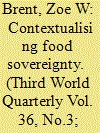

|
|
|
|
|
| Summary/Abstract |
As food sovereignty spreads to new realms that dramatically diverge
from the agrarian context in which it was originally conceived, this
raises new challenges, as well as opportunities, for already complex
transnational agrarian movements. In the face of such challenges calls
for convergence have increasingly been put forward as a strategy for
building political power. Looking at the US case, we argue that historically
rooted resistance efforts for agrarian justice, food justice and
immigrant labour justice across the food system are not only drawing
inspiration from food sovereignty, but helping to shape what food
sovereignty means in the USA. By digging into the histories of these
resistance efforts, we can better understand the divides that exist as
well as the potential for and politics of convergence. The US case
thus offers important insights, especially into the roles of race and
immigration in the politics of convergence that might strengthen the
global movement for food sovereignty as it expands to new contexts
and seeks to engage with new constituencies.
|
|
|
|
|
|
|
|
|
|
|
|
|
|
|
|
| 6 |
ID:
138455
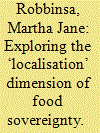

|
|
|
|
|
| Summary/Abstract |
The ‘localisation’ narrative is at the heart of food sovereignty in theory and practice, in reaction to the ‘distance’ dimension in the dominant industrial food system. But while it is a central element in food sovereignty, it is under-theorised and largely unproblematised. Using the theoretical concepts of food regime analysis, uneven geographical development and metabolic rift, the author presents an
exploratory discussion on the localisation dimension of food sovereignty, arguing that not all local food systems are a manifestation of food sovereignty nor do they all help build the alternative model that food sovereignty proposes. The paper differentiates local food systems by examining character, method and scale and illustrates how local food systems rarely meet the ideal type of either food sovereignty or the capitalist industrial model. In order to address five forms of distance inherent in the global industrial food system, localization is a necessary but not sufficient condition for food sovereignty. A more comprehensive food sovereignty needs to be constructed and may still be constrained by the context of capitalism and mediated by the social movements whence it comes.
|
|
|
|
|
|
|
|
|
|
|
|
|
|
|
|
| 7 |
ID:
175480
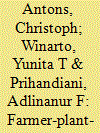

|
|
|
|
|
| Summary/Abstract |
In the last two decades, some Javanese rice farmers have learned to be plant breeders with the help of Farmer Field Schools for Participatory Plant Breeding. However, they have experienced problems with seed and intellectual property laws primarily focused on the strengthening of the seed industry and compliance with development plans. A number of farmers have been prosecuted for experimenting with seeds, prompting a partly successful challenge to relevant provisions in Indonesia’s Constitutional Court. Subsequent legislative changes have restored some farmers’ rights, but also brought new reporting requirements and limitations. Using James Scott’s concept of “transformative state simplifications,” this article shows that legal challenges to regulations are just one strategy of self-help. The political reform process and possibility for constitutional challenges have opened up space for debates about how farmers can benefit from laws that seek to regulate their cultivars. The United Nations Declaration on the Rights of Peasants and other developments are likely to intensify discussions about what precisely various laws mean by their encouragement of “small farmer varieties,” “food sovereignty,” and a “sustainable agricultural cultivation system.”
|
|
|
|
|
|
|
|
|
|
|
|
|
|
|
|
| 8 |
ID:
193634


|
|
|
|
|
| Summary/Abstract |
How did North Koreans reform their agricultural technology after the massive famine in the 1990s? While the existing literature focuses its analysis on the nexus between the state and market to assess the possibility of a transition economy, we instead examine agricultural methods and technologies employed in farmlands to evaluate the nature of technological reforms. After identifying technology reforms on the basis of primary sources published in the DPRK such as yearbooks, academic journals, and newspaper articles, as well as other materials published in South Korea, Japan, and the United States and by international organizations, we classify them into two kinds of initiatives: modernization measures that sought to address the failure to modernize agricultural technologies and ecology-friendly farming practices designed to reduce or reverse negative externalities of the industrial agriculture. While the two are commonly seen as incompatible, we conclude that North Koreans synthesized the two to transform their decaying industrial agriculture into a more modernized and more ecology-friendly sector. They have, through these reforms, maintained food sovereignty as their pillar of agriculture but complemented it with food security on a national scale as a way to maximize their agriculture outputs. Most of these initiatives seem to continue to date although it remains to be seen how these initiatives have affected or will affect the overall productivity and sustainability of the agricultural sector.
|
|
|
|
|
|
|
|
|
|
|
|
|
|
|
|
| 9 |
ID:
138457
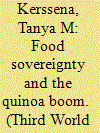

|
|
|
|
|
| Summary/Abstract |
In the last three decades, quinoa has gone from a globally obscure food to an internationally traded product with rising global consumer demand. This transformation has had complex social and ecological impacts on the indigenous agropastoral communities of the southern Altiplano region of Bolivia. This article analyses the role that global quinoa markets have played in the repopulation and revitalisation of this region, previously hollowed out by out-migration. Yet, it also points to a number of local tensions and contradictions generated or magnified by this process, as peasants struggle to harness the quinoa boom as a force of ‘sustainable e-peasantisation’ and ‘living well’. Finally, the article suggests that the food sovereignty movement should place greater emphasis on examining the culturally and historically specific challenges facing re-peasantisation in particular places.
|
|
|
|
|
|
|
|
|
|
|
|
|
|
|
|
| 10 |
ID:
138458
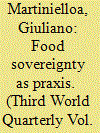

|
|
|
|
|
| Summary/Abstract |
This article critically reflects upon conceptual and analytical questions that affect the practical implementation of food sovereignty in Uganda, a country often labelled as the potential breadbasket of Africa. It proposes to look at the integration of food and land-based social relations in the context of localised and historical–geographical specificities of livelihood practices among Acholi peasants in northern Uganda as a way to ground the concept. It argues that many of the organising principles at the core of the food sovereignty paradigm are inscribed in the socio-cultural and ecological practices of peasant populations in northern Uganda. Yet these practices are taking place in an increasingly adverse national and international environment, and under circumstances transmitted from the past, which enormously challenge their implementation and jeopardise the future of food security and sovereignty prospects for peasant agriculture.
|
|
|
|
|
|
|
|
|
|
|
|
|
|
|
|
| 11 |
ID:
142056
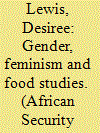

|
|
|
|
|
| Summary/Abstract |
Policy research and scholarship on food has rapidly increased in recent decades. The attention to ‘gender' within this work appears to signal important practical and academic efforts to mainstream gendered understandings of food consumption, distribution and production into expansive conceptualisations of human security. This article argues that the gender-related work on food has wide-ranging and often troubling political and theoretical foundations and implications. Often growing out of knowledge regimes for managing social crises and advancing neo-liberal solutions, much gender and food security work provides limited interventions into mainstream gender-blind work on the nexus of power struggles, food resources and globalisation. A careful analysis of knowledge production about gender and food is therefore crucial to understanding how and why feminist food studies often transcends and challenges dominant forms of scholarship and research on food security. This article's critical assessment of what food security studies in South Africa has entailed at the regional level and in global terms also focuses on the methodological and theoretical feminist interventions that can stimulate rigorous conceptual, research and practical attention to what has come to be understood as food sovereignty.
|
|
|
|
|
|
|
|
|
|
|
|
|
|
|
|
| 12 |
ID:
181326
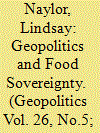

|
|
|
|
|
| Summary/Abstract |
The everyday practice of food sovereignty varies across place, and efforts to democratize food systems and create more holistic and equitable forms of food production and access are highly politicized. Considering the “geo” of these practices assists with understanding how perceptions of place shape imaginaries about food sovereignty in place. Using the example of education-based food sovereignty tourism in Cuba I examine, in this paper, how outsiders from the US map geopolitical imaginaries onto Cuba in their efforts to see the “real Cuba” and authentic food sovereignty practices. I argue that the myopic character of food sovereignty tours creates a re-writing of space based on participants’ hopes and fears regarding agricultural production and consumption. Drawing on a feminist geopolitical framing, I use recent theorizations that consider geopolitical encounters via tourism to elucidate what I observed, which trended towards paternalistic geopolitical imaginaries of Cuba.
|
|
|
|
|
|
|
|
|
|
|
|
|
|
|
|
| 13 |
ID:
169146
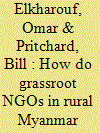

|
|
|
|
|
| Summary/Abstract |
Recent research has promoted the idea that political struggles over food systems can be understood through the concepts of food security (the right to access food) and food sovereignty (the right to exercise control over food systems). These concepts emphasise different political priorities in the social relations of food: for the former, the promotion of decent work and the strengthening of the social safety net to enhance people's abilities to put food on their plates; for the latter, the defence of land, water and resource rights, to underpin capabilities for food own‐provisioning. The question we pose in this paper is how these priorities are articulated by grassroots non‐government organisations working at the frontline of global food poverty? Interviews with 22 representatives of food‐related non‐government organisations in Myanmar were used to elicit narratives about how they understood their challenges. The paper finds that narratives did not cohere exclusively to either the food security or food sovereignty concept, but blended ideas associated with the political priorities of both in complex and contradictory ways. These insights lend important firsthand evidence to the argument that supports a multi‐dimensional framing of the politics of food that is inclusive of the diverse struggles highlighted by food security and food sovereignty concepts.
|
|
|
|
|
|
|
|
|
|
|
|
|
|
|
|
| 14 |
ID:
173783
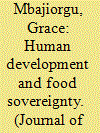

|
|
|
|
|
| Summary/Abstract |
Food security strategies are determined by the prevailing realities within households and communities. Therefore, it is not surprising that in South Africa agricultural transformation is an important food security strategy. This article examines the role of human development and food sovereignty in fostering conditions that enable rural households to enhance their food security capabilities. Using an in-depth analysis of literature, national, regional and international instruments, this article takes its departure from the fact that subsistence agriculture is an effective strategy for improving household food needs when implemented within the broader human rights framework of human development. The results reveal that agriculture has the potential to increase household food security if appropriate agricultural technologies and productive resources such as land are made accessible to households. Further, for agriculture to attain optimal efficiency as a food security strategy, policies on agrarian transformation should be implemented within broader social development programmes.
|
|
|
|
|
|
|
|
|
|
|
|
|
|
|
|
| 15 |
ID:
139577
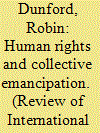

|
|
|
|
|
| Summary/Abstract |
This article develops contextually grounded accounts of emancipation in general and notions of collective rights based emancipation in particular by identifying a form of emancipatory politics in which collectives demand rights for themselves. The article develops the idea of collective, rights based emancipation by focusing on the practices of two related social movements, the Landless Workers Movement (MST) and la Via Campesina. The MST and Via Campesina seek to replace existing rights to ‘food security’ with a human right to ‘food sovereignty’. While food security agendas emphasise the role of international governance agencies in providing food on behalf of others, food sovereignty is secured by peasant social movements themselves. Furthermore, practices of active citizenship and democratic organisational structures, built through the grassroots and transnational struggles through which peasants raise their demand for human rights, are vital in enacting rights to food sovereignty. In instances where victims are not entirely silenced and powerless, this combination of a demand for human rights and the development of practices of citizenship that enable people to demand and secure rights for themselves provides a contextually grounded emancipatory alternative to interventionist politics that, however well intentioned, risk reinforcing the dependence of purportedly powerless victims.
|
|
|
|
|
|
|
|
|
|
|
|
|
|
|
|
| 16 |
ID:
174552
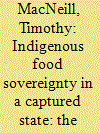

|
|
|
|
|
| Summary/Abstract |
This study explores the emergence of the Afro-Indigenous food sovereignty movement in the context of a captured Honduran state and unequal political economy. In contrast with national-level research that has advocated a policy of food security in the context of non-indigenous campesino movements, this work explains how food sovereignty is more appropriate regarding Garifuna Hondurans. In a political economy that has precluded other options, and given the deep cultural relation that Garifuna activists have to land and autonomy, food sovereignty provides a possibility around which Indigenous development can be animated. It encapsulates a local ‘fight’ response to repression as an alternative to northern ‘flight’, often via migrant caravans, that many Garifuna have undertaken. This study shows how food sovereignty, more than being a technical policy set, is a discursive and material node through which dispossessed and especially indigenous populations can enhance decolonial power in the contestation of entrenched hegemonic and institutionalised power in a corrupt, unequal and colonised political economy.
|
|
|
|
|
|
|
|
|
|
|
|
|
|
|
|
| 17 |
ID:
138463
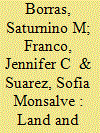

|
|
|
|
|
| Summary/Abstract |
Land and food politics are intertwined. Efforts to construct food
sovereignty often involve struggles to (re)constitute democratic
systems of land access and control. The relationship is two-way:
democratic land control may be effected but, without a strategic
rebooting of the broader agricultural and food system, such
democratisation may fizzle out and revert back to older or trigger
newer forms of land monopoly. While we reaffirm the relevance of
land reform, we point out its limitations, including its inability to
capture the wide array of land questions confronting those implicated
in the political project of food sovereignty. Our idea of the land
framework of food sovereignty, described as ‘democratic land
control’ or ‘land sovereignty’, with working peoples’ right to land at
its core, is outlined, with a normative frame to kick-start a debate and
possible agenda for future research.
|
|
|
|
|
|
|
|
|
|
|
|
|
|
|
|
| 18 |
ID:
154558
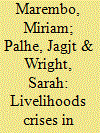

|
|
|
|
|
| Summary/Abstract |
The Vidarbha region in Maharashtra, India, home to 3.4 million smallholder farmers, is a major cotton-producing region in one of the wealthiest Indian states. However, between 1995 and 2013, more than 60,000 farmers took their own lives. Many of these suicides have been linked to extreme debt created by the expensive mono-cropping of Bt cotton. Some farming households have responded to these pressures by abandoning Bt cotton growing and turning to sustainable agriculture using traditional mixed-cropping methods. Yet the question remains: have the changes produced better livelihoods in Vidarbha? Using a food sovereignty framework, we assess the impact of these changes through an analysis of a 200-household survey across six districts in Vidarbha. We also explore the meaning of food sovereignty for those who practise it, seeking to better understand some of the complexities and experiences associated with the term.
|
|
|
|
|
|
|
|
|
|
|
|
|
|
|
|
| 19 |
ID:
138460
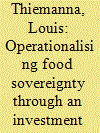

|
|
|
|
|
| Summary/Abstract |
A central question in the current debate on food sovereignty concerns the concepts and approaches to assist and frame the operationalisation of its agendas for peasant-based agricultural development. Another is the search for inclusive methods and language to discuss these operational, ‘territorial’ agendas with potential constituents. This paper argues that both questions call for an investment lens, a complementary approach within food sovereignty that proposes and discusses investments rather than political demands. Decolonial epistemology w ill treat existing investment lenses critically; however, in doing so it also urges new perspectives on what constitutes investment, the categories of cost involved, and the measurements employed. In following the rationale of investment in agro-ecological theory and practice, the paper next argues that the reconstruction of ‘big push theory’ outside the ‘modernisation’ paradigm that once produced it is possible, and that formulation and discussion of big push strategies could reclaim a space within critical agrarian studies. Big push theory offers a frame for the consistent critique of ‘silver bullet’ development projects through the study of negative feedback loops; and a frame for the study of positive feedback loops, which crucially underlie the proposals of food sovereignty movements for broad, integrated changes
in agrarian systems.
|
|
|
|
|
|
|
|
|
|
|
|
|
|
|
|
| 20 |
ID:
195399


|
|
|
|
|
| Summary/Abstract |
Confronting the coming five decades from our present conjuncture demands – to paraphrase Antonio Gramsci’s famous mantra – both critical pessimism and a wilful politics of hope. In this article, we engage with the politics of climate breakdown and the responses to wider socio-ecological crises with a necessary critical pessimism. Specifically, we confront the capture of green transition imperatives by finance capital, as well as the troubling orientation of transition towards building new structures of accumulation around the vision of an electrified consumer society. We also see the coming decades being marked by the ever-increasing wealth of global asset-owning classes – who, by definition, enclose the atmospheric commons faster than any other community. Against this dystopian picture of increasingly concentrated wealth, corporate excess, and terrestrial crisis, we focus on the stubborn reproduction of socio-ecological life through various grounded projects across the world. We engage with communities who work against structural constraints to reproduce life from below through urban commoning, food sovereignty, Indigenous organising, and caretaking economies – all of which are scaling out their visions through alternative internationals. All of these projects, we argue, present a planetary and multiscalar political economy in practice, which connects grounded experience with resistance to the dynamics of capitalism at the state, corporate, and transnational levels. With lessons from these communities in mind, we call for a ‘planetary political economy of the global majority’, which prioritises the reproduction of socio-ecological life according to the visions of grounded anti-systemic projects.
|
|
|
|
|
|
|
|
|
|
|
|
|
|
|
|
|
|
|
|
|